 Amphibious armored vehicle unit conducts open sea drill
Amphibious armored vehicle unit conducts open sea drill
 Water relay in Henan
Water relay in Henan
 Ethnic culture feasts eyes of travelers
Ethnic culture feasts eyes of travelers
 80 security dogs assembled in Nanjing police dog training base
80 security dogs assembled in Nanjing police dog training base
 Graffiti artists paint on street walls in Xinjiang
Graffiti artists paint on street walls in Xinjiang
 Story of ceramic artist Zhang Lingyun
Story of ceramic artist Zhang Lingyun
 Magic summer night dream in Hongyuan
Magic summer night dream in Hongyuan
 Incredible creatures in headwaters drainage region of Lancang River
Incredible creatures in headwaters drainage region of Lancang River
 The future of rock n' roll seen in young rockers in China
The future of rock n' roll seen in young rockers in China
 Magnificent Yanziya Cliff
Magnificent Yanziya Cliff
HARBIN, Aug.15 -- Testimonies of former Japanese soldiers have once again revealed inhuman atrocities in China during WWII.
Museums in Northeast China's Heilongjiang Province have published testimonies ahead of the anniversary of Japan's surrender on Friday as proof of war crimes by the Japanese in China.
The testimonies have been collected by Jin Chengmin, curator of the Museum of Evidence of War Crimes by Japanese Army Unit 731, through lecturers, visits and interviews since 1998.
CUT-THROAT BUSINESS
Ken Yuasa was a surgeon at Lu'an Military Hospital when the Japanese troops invaded north China's Shanxi Province. In his testimony, he said,"I directly participated seven vivisections, killing a total of 14 Chinese people."
Describing the first vivisection, Yuasa said, "It was a cold day in March, 1942. The director of the hospital told us to start practicing vivisections. The thought of quitting flashed through my mind for a second, but then I obeyed, because it was an order from the Emperor."
"I cut with strength. It was soft inside and I could not find the organ, so I cut again. I put my hand inside and that was how I found it. Then I moved on to the trachea. The person used for the experiment was still laughing, when I cut the neck and the blood gushed out. I can still remember everything clearly... I think I've turned into a devil, not a human anymore."
In 1956, Yuasa was exempted from prosecution by the Chinese government and returned to Japan. He later published a book confessing the crimes.
"These inhuman crimes are intolerable, but now in Japan some still think killing during war is acceptable and some deny their wartime crimes," Yuasa said.
ESCAPEES MUST DIE
To develop germ weapons, Unit 731 conducted outdoor bacterial experiments on humans.
Sadao Koshi, a former driver at Unit 731, said in a video that he participated in experiments on humans dozens of times and once 40 people were run over and killed as they tried to escape.
Koshi's testimony was donated by Masataka Mori, a professor at Japan's Shizuoka University, who recorded it in 1994.
Koshi said, "People were taken to a field and tied to posts. Helmets and iron shields were put on them to protect the vital parts of their bodies, leaving only arms, legs and hips outside. Then planes dropped bombs carrying plague bacillus and collectotrichum."
"When the bombs exploded the bacteria liquid fell like rain, and the victims started to scream," he said.
Koshi said once a man untied himself and helped others to escape. "We chased them by car and ran them over one by one... I can still remember the feeling when I hit them."
Koshi published a book in 1983 to testify about crimes by himself and Unit 731. Ever since, he has been receiving threatening calls and letters.
"I have to speak the truth, so that if I die there will be no regrets," Koshi said on the video.
"All these testimonies are precious, they've told the real story," said Yang Yanjun, a researcher at the Unit 731 Research Center of Harbin Academy of Social Sciences.
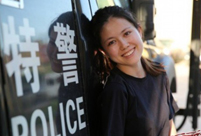 Beautiful policewoman in an anti-terrorism SWAT team
Beautiful policewoman in an anti-terrorism SWAT team Cute photos of little Taoist nuns and monks go viral online
Cute photos of little Taoist nuns and monks go viral online Amphibious armored vehicle unit conducts open sea drill
Amphibious armored vehicle unit conducts open sea drill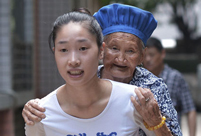 A post-90s girl who takes grandma to work
A post-90s girl who takes grandma to work Beijing policewomen posters become a hit
Beijing policewomen posters become a hit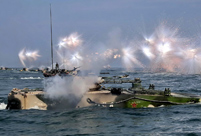 Armored regiment trains on the sea
Armored regiment trains on the sea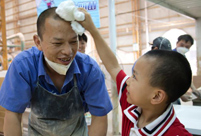 Children spend 'Father's Day' with dads at work
Children spend 'Father's Day' with dads at work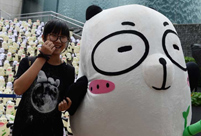 'Pan Da' appear in Shanghai World Financial Center
'Pan Da' appear in Shanghai World Financial Center Champions take selfies on podium
Champions take selfies on podium The vanishing folk skills
The vanishing folk skills Intoxicating beauty of Dali, Yunnan province
Intoxicating beauty of Dali, Yunnan province Memorable moments of Ludian earthquake
Memorable moments of Ludian earthquake Bring world together to help elephant
Bring world together to help elephant 'Building Dreams'
'Building Dreams'  Labrang Monastery
Labrang MonasteryDay|Week|Month